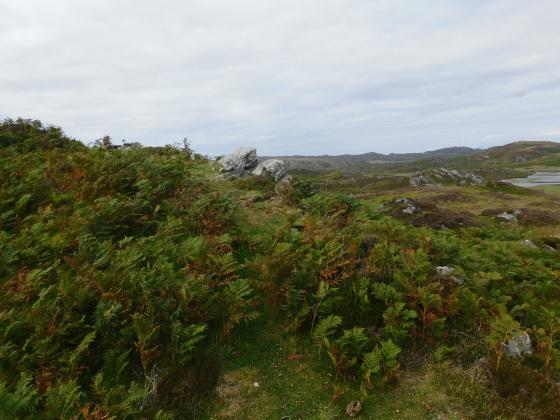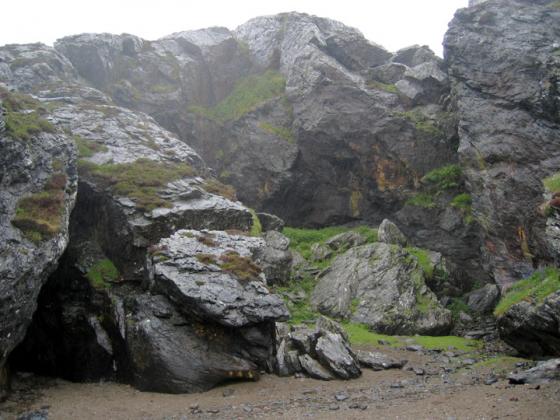
This stone is on the north east part of the cairn.

This stone is on the north east part of the cairn.

From the west side.

A closer look at the cairn, grass covered, field clearence but a large footprint and at least 1.5m tall.

Good placement for both loch and sea.

Top of the northern stone.

Chokes at the bottom of the south stone.

A lovely shape to the top of the southernmost stone.

The mpre southerly stone with the possible cairn behind.

We were in the house with the solar panels, superb site/sight every morning.

Almost directly behind is a dun, on the hill.

Looking towards the hamlet of Upper Kilchattan.

The limpets, also showing the way to a dun.

One of the hammers is shaped like a fish

With the cairn in the foreground

The hammers sit in front of a cairn most of which is now overgrown with grass

The Hammers with the loch in the background
This has to be one of the easiest fieldnotes to write. From the house in Kilchattan walk 200m south, crossing the B8086, there is a gate leading into the field.
A great way to start every morning with Dun Meadhonach, slightly to the south west.
They say there was a stone circle here at one point, maybe yes or maybe no, one thing definite is that the two stones are in clear view Loch Fada, to the east, and the stony beach at Port Mor to the west.
Slightly to the west there appears to be remnants of a cairn, there is no kerb, however there is one large stone that might or might not have stood. Almost feels like Cultoon Stone Circle in Islay and its nearby site.
Time to head south west.
Visited 11/08/2024.
Fingal’s Limpet Hammers are a pair of standing stones in Scotland that are associated with the legendary Celtic giant Fingal. The stones are named for their resemblance to limpet hammers, which are tools used to break limpets off rocks. The stones are also so large that only a giant like Fingal could wield them.
The stones are also known as Carrach An, which may mean “the pillars or erect stones”. During ploughing in the early 20th century, an underground passage was discovered, but it was later covered up.
BritainExpress
I couldn’t resist the name of these standing stones. At a leaning 10ft and 8 1/2 ft they stand 45 feet apart. Apparently a limpet hammer is a stone tool used for persuading the poor molluscs off their rocks, a term also applied to any number of mysterious stone tools by bemused archaeologists (none of whom had probably ever eaten a limpet).





















